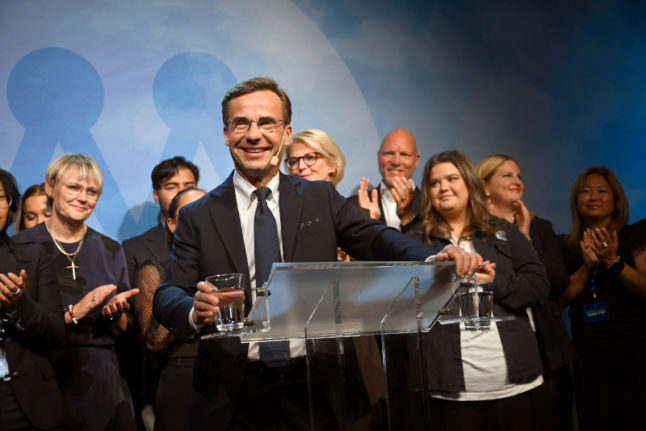Hej,
The left bloc and the right bloc were neck-and-neck in the preliminary results of Sweden’s election, published in the wee hours of Monday.
It was a strange night. When the exit polls first came in, and the districts began to count their votes, it initially appeared as though the left bloc would manage to cling on to government – but after the majority of districts had declared, the balance of power tilted in the right side’s favour.
It looks like Sweden might possibly be heading for a change of government, with the right bloc (consisting of the Sweden Democrats, Moderates, Christian Democrats and Liberals) on Monday morning just one seat ahead of the left (Social Democrats, Centre, Left and Greens).
I try to hedge my bets when writing this column though, because these results are preliminary only and it’s a narrow election. Votes from Swedish citizens abroad and any early voting ballots that didn’t make it to the polling stations in time for Election Day get counted on Wednesday.
In the last election, three seats changed between Election Day and the final count, with one flying back and forth between the Centre Party and the Sweden Democrats – often referred to by Swedish political pundits as mandatpingis, likening the seat allocation to a game of table tennis.
So don’t rejoice or grieve too much, at least not yet.
Even most of the party leaders were careful not to claim victory in their midnight speeches, warning that we need to wait another couple of days.
Despite their bloc leading, it looks like a disastrous election for the conservative Moderate Party, who have long been Sweden’s leader of the opposition. Not because they did much worse than in the 2018 election (they didn’t), but because they were overtaken by the anti-immigration Sweden Democrat party as the largest right-wing party.
Sweden Democrat leader Jimmie Åkesson, on the other hand, bounded onto stage to chants of “sha-la-la-la-la” at his election party, exclaiming that their 20-something percent meant they were “a big party, for real”.
Even he was a tad cautious about claiming outright victory for the right bloc, but with only a few ten thousands of votes left to be counted, it’s going to be difficult for the left side to make up the difference.
So what happens now?
First, we need to wait for Sweden to finish counting the votes and allocate the seats in parliament. Then, the work to form the next government begins. The incumbent government doesn’t automatically get ousted, so first parliament will have to vote on whether or not to accept Magdalena Andersson (let’s assume based on the current results that they won’t).
If, or currently more likely, when, the prime minister is then forced out in that vote, the speaker of parliament will initiate talks with the party leaders to figure out who is best positioned to form a new government.
That could be the Sweden Democrats, as the biggest party of the right wing. But it could also be the Moderates, since their leader Ulf Kristersson enjoys the support of more right wing parties than Åkesson does.
In any case, the road ahead is unclear.
The other parties in the right bloc have previously said that although they want the support of the Sweden Democrats in parliament, they would rather not have them in government thanksverymuch.
But that was when the Moderates were still the largest right-wing party. With the Sweden Democrats now outperforming them, their negotiating power has grown considerably, but it may be too big an ask for the others.
Two of the questions that remain are: Will the Sweden Democrats accept not being part of a right-wing government despite being the largest right-wing party? Or will the other right-wing parties be able to stomach allowing the far-right into government for the first time in Sweden?
Both seem equally unlikely at the moment, but the only reward that may be sweet enough for the right-wing parties to accept significant concessions is the chance to oust the centre-left Social Democrats.
In the run-up to the election, The Local looked at how the Sweden Democrats could change life for foreigners in Sweden if they do get the influence they want. Here’s a link to our analysis.
On the left side, Andersson’s success will depend on how willing the Centre Party and the Left Party are to put aside their differences and work together. The two parties are united in their dislike of the Sweden Democrats, but they remain so far apart on other key issues such as the budget that any formal collaboration is unpalatable to both.
But again, let’s remember that the final result is not yet in. Votes from Swedes abroad tend to lean right, but it is not clear how many early voting ballots remain to be counted. It could still go either way.
The Local live blogged Election Night, and it’s worth a read to catch up on what happened. We’ve got plenty of interviews with experts and senior party representatives, and we’ll spend the coming days and weeks putting the election result in context for foreign residents in Sweden.
We’re also aiming to publish a special election episode of our Sweden in Focus podcast later today, so keep an eye out for the next episode to drop.
Thanks for following our election coverage and for reading this column.
Best wishes,
Emma Löfgren
Editor, The Local Sweden
Sweden Elects is a weekly column by Editor Emma Löfgren looking at the big talking points and issues in the Swedish election race. Members of The Local Sweden can sign up to receive the column as a newsletter in their email inbox each week. Just click on this “newsletters” option or visit the menu bar.




 Please whitelist us to continue reading.
Please whitelist us to continue reading.
Member comments